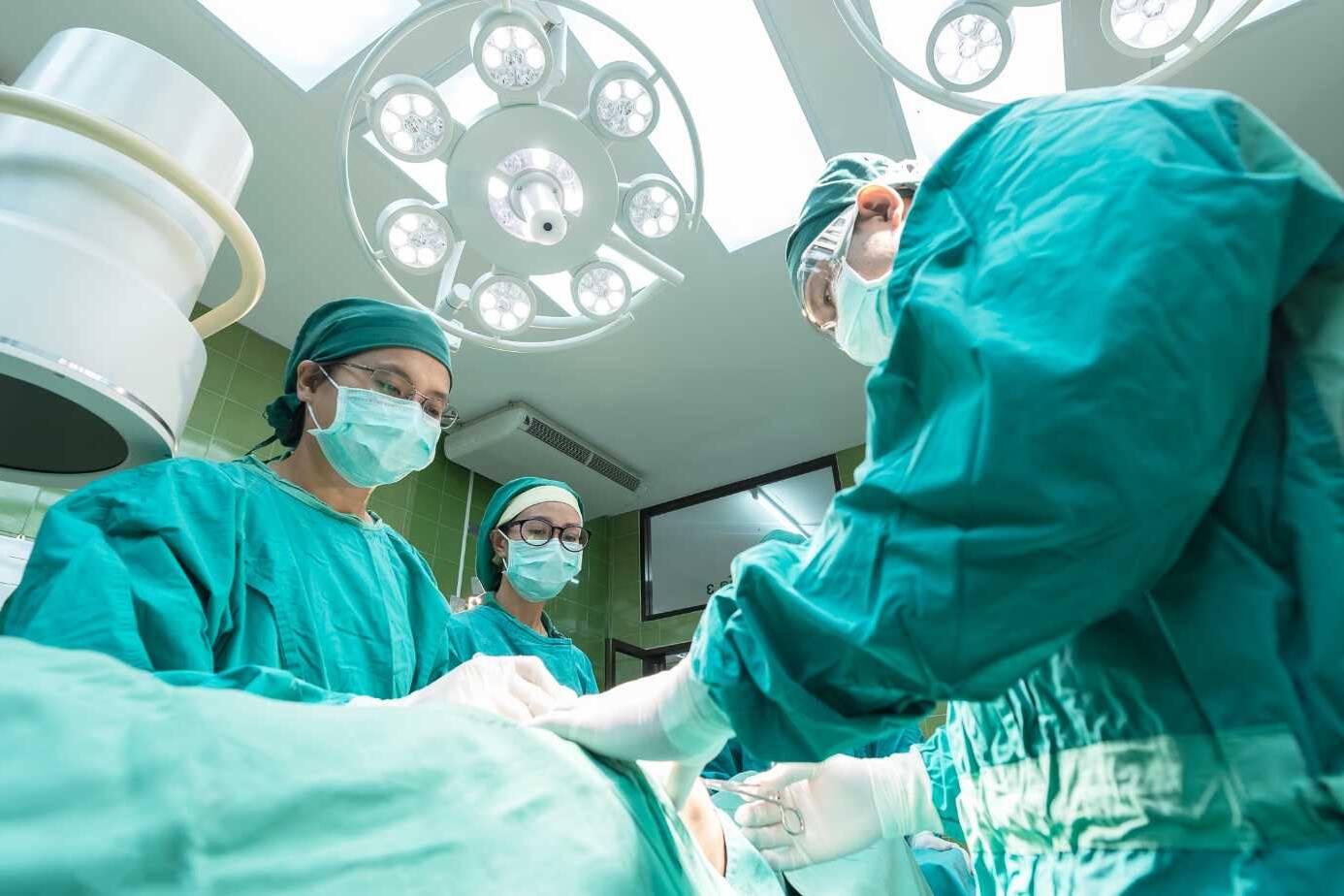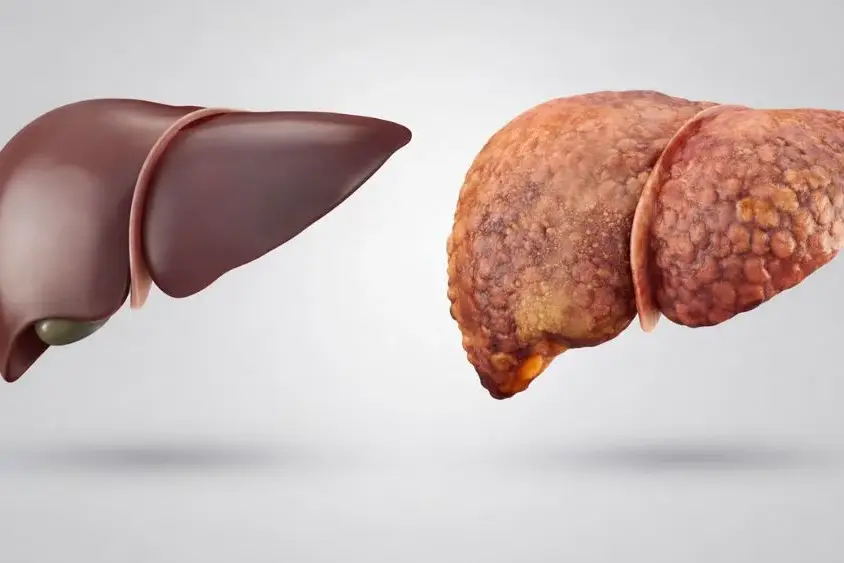Intestinal obstruction is a blockage in the small or large intestine. It prevents food or liquid from passing through. Causes can be from adhesions in the abdomen after surgery, hernias, or colon cancer. Big reasons also include certain medicines or intestinal issues like Crohn’s disease. Without treatment, these blockages can cause severe problems. But, getting medical help quickly can often fix the issue.
Table of Contents
ToggleIn adults, intestinal obstruction is mainly from things like adhesions, hernias, or colon cancer. For children, it’s often because a part of the intestine moves into another. Issues like Crohn’s disease, cancer in the abdomen, or past surgeries increase the risk of blockages.
Intestinal pseudo-obstruction seems like intestinal obstruction but without physical blockage. It may happen due to problems with muscles, nerves, or from certain medicines. If not treated, the complications can be very serious. These include tissue death and infections like peritonitis.
If you notice symptoms of intestinal obstruction, seek medical help right away. This is to avoid severe complications that could be life-threatening. Knowing the possible causes and signs helps you get the right care and treatment.
What is Intestinal Obstruction?
The small intestine and colon are key parts of your digestive system. They break down the food you eat and absorb its nutrients. What’s left becomes stool, which you pass during a bowel movement. If a blockage stops this process, it’s called intestinal obstruction.
Overview of the Digestive System
Your digestive system breaks down food, takes out nutrients, and gets rid of what’s left. The small intestine and colon, or the intestines, help with this. When everything works well, they move food and waste smoothly.
How Intestinal Obstruction Affects Digestion
Intestinal obstruction happens when something blocks food, liquid, or waste in the intestines. This blockage stops the body from absorbing nutrients and letting out waste. If not treated, it can cause big problems. That’s why it’s so important to see a doctor right away.
Symptoms of Intestinal Obstruction
Intestinal obstruction brings on a lot of tough symptoms. It’s important to know these signs. That way, you can tell if you need to see a doctor fast.
Abdominal Pain and Cramping
The main sign of intestinal obstruction is strong belly pain that might move around. This pain starts light but can quickly get worse. It could be in one spot or all over your belly.
Vomiting and Loss of Appetite
Vomiting is a key sign you have an issue. You might throw up several times because nothing can move through your gut. This makes you lose your appetite too.
Constipation and Inability to Pass Gas
Having trouble with pooping or not being able to pass gas shows you might have a blockage. The gut isn’t moving things along as it should. This causes a lot of discomfort.
Abdominal Swelling and Distension
If your gut is blocked, it can fill up with gas, fluid, and food. Your belly might look and feel swollen. A large, hard belly is a big warning sign of a severe blockage.
These symptoms happen because a block stops things from moving along. If you notice these signs, get medical help right away. This can be a sign of a serious condition.
Causes of Intestinal Obstruction
Intestinal obstruction can happen from several different causes. Some reasons are more usual than others. Knowing these causes helps doctors diagnose and treat it faster.
Adhesions from Previous Abdominal Surgery
After you’ve had abdominal or pelvic surgery, adhesions can form. Adhesions are like bands of scar tissue. They can make the intestines narrow and cause a blockage.
Hernias
When an organ or tissue bulges through a weak spot in your belly, it’s a hernia. Some hernias, like inguinal or umbilical hernias, are more likely to block the intestines.
Colon Cancer and Other Tumors
Growths, like colon cancer, can block the passage of food and waste. These blockages might happen in the large or the small intestine.
Inflammatory Bowel Diseases
Crohn’s disease and ulcerative colitis can make the intestines inflamed. They can also make the intestines narrow, causing a blockage.
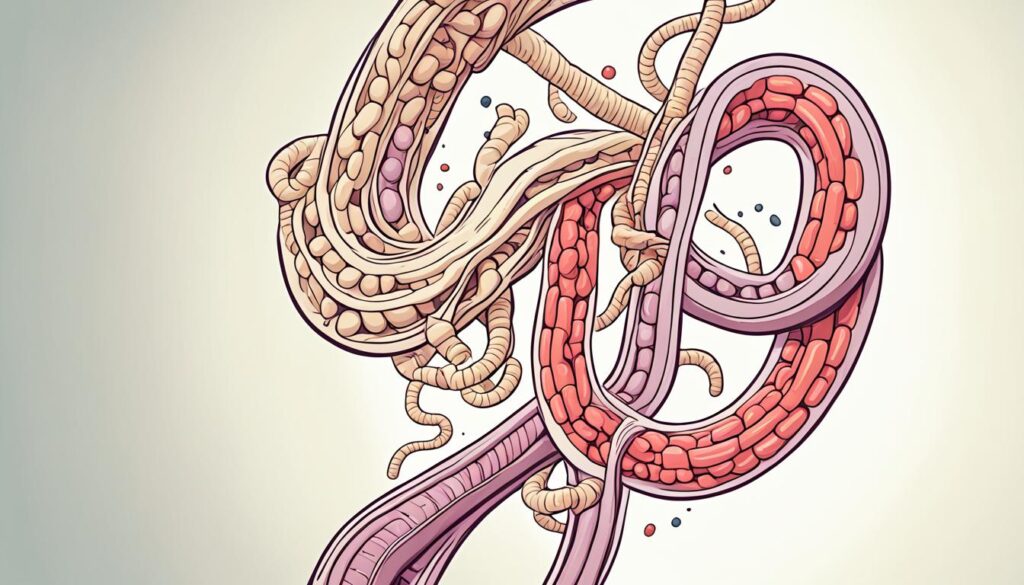
Risk Factors for Intestinal Obstruction
Several diseases and conditions can make it more likely for you to develop an intestinal obstruction. Abdominal or pelvic surgery is a big one. It can cause scarring, which might block how food and waste move through your intestines.
Crohn’s disease is also a key risk factor. It’s a type of inflammatory bowel disease that can narrow the intestines. Cancers in the abdomen, like colon cancer, can sometimes lead to blockages too.
Other issues that could up your risk are hernias, accidentally swallowed items, chronic constipation, and diverticulosis. This last one is when small pouches form in the intestinal wall.
Knowing about these risk factors for intestinal obstruction is important. Early treatment and management of any health conditions can prevent a major blockage. Working with your doctor can help you reduce your risk and keep your digestive system healthy.
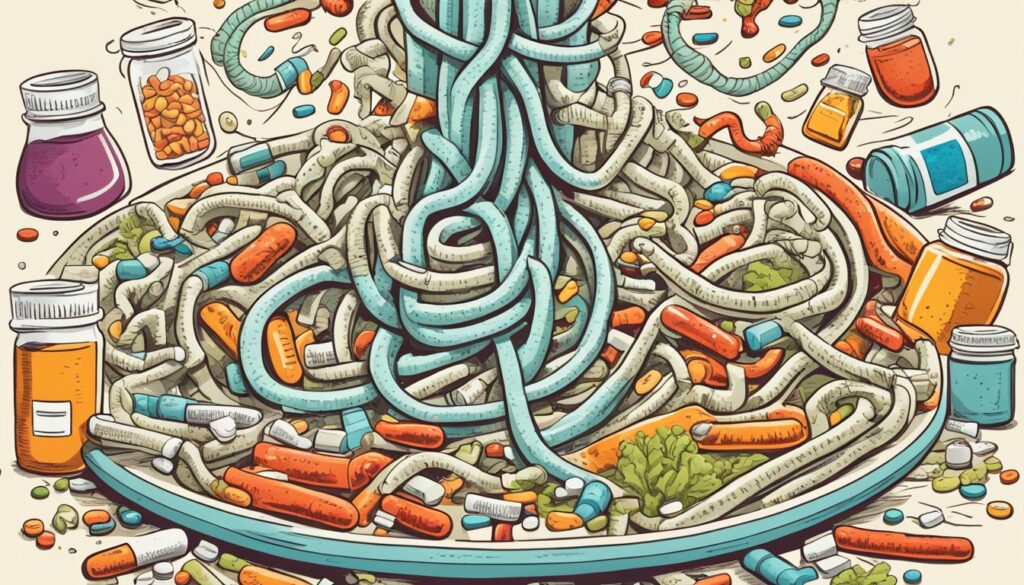
Diagnosing Intestinal Obstruction
Healthcare providers will start by looking at your medical history and checking you over. This helps them understand your symptoms, any past surgeries, and how your current problem started.
Medical History and Physical Examination
Your provider will ask about stomach pain, throwing up, constipation, or other stomach issues. They’ll also talk about your diet or any surgery you’ve had. These details could be linked to a digestive blockage.
In the physical exam, they’ll gently press on your stomach to feel for pain or swelling. They might also listen to your stomach with a stethoscope to hear any unusual sounds.
Imaging Tests
Besides talking and examining you, your provider might order certain tests. These can help spot the blockage and find out why it happened. They usually include:
- Abdominal X-rays – Shows a basic picture of your stomach area. This can reveal the blockage’s location and its severity, plus any hernias or tumors.
- CT scans – Gives a more detailed view of your insides in 3D. It’s really good at finding the blockage and its cause.
- MRI – A more advanced scan to get detailed images of your bowels and nearby tissues.
These tests help doctors figure out what’s wrong. They use the results from the diagnosing intestinal obstruction, medical history, physical examination, and imaging tests to plan your care.
Treatment for Intestinal Obstruction
The kind of treatment for intestinal obstruction changes depending on the cause and how serious it is. If it’s not too bad, your doctor might start with ways to help that don’t involve surgery. This can get rid of symptoms and make your digestion normal again.
Nonsurgical Treatments
For mild cases, they might give you fluids through a vein, which stops you from getting dehydrated. Doctors also use a tube through your nose to your stomach to lower pressure in your belly. They give you medicine to help the muscles in your gut relax, easing pain and reducing throwing up. This usually works well for partial obstructions or when the issue is a temporary one, like a hard piece of stool blocking things.
Surgical Intervention
If the blockage is serious and doesn’t get better with these simpler treatments, you might need surgery. This means the doctors will open you up and fix the problem by taking out the bad part of your intestine, removing things that have stuck together, or pushing back in an area that has bulged out. The aim of this surgical treatment is to get your digestion back to normal and keep away dangerous issues like tissue dying or tearing.
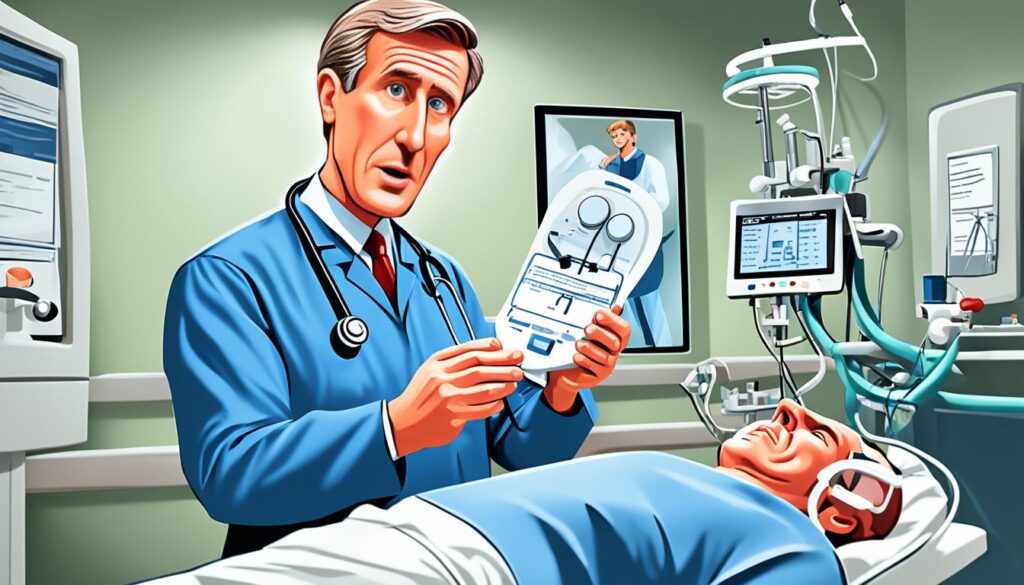
How they treat your intestinal obstruction will be decided by looking at what’s going on with you and how bad your symptoms are. Your doctor will guide you to the best plan to handle your situation and avoid any big problems.
Complications of Untreated Intestinal Obstruction
Not paying attention to the signs of intestinal obstruction is serious. The main risk is when tissues start to die because they don’t get enough blood. This happens when a part of the intestine is blocked. If the blood flow is cut off for too long, the intestinal wall can tear.
Tissue Death and Perforation
When an obstruction happens, the part of the gut after the blockage starts to collapse. And the part before it swells up. This stops the gut from working right. Without oxygen and nutrients, the tissue starts to die. A tear in the gut can then let out its contents into the belly.
Infection and Peritonitis
A gut tear can cause a bad infection called peritonitis. It’s when the lining of the belly gets inflamed. Peritonitis is very serious and needs quick treatment. If not treated, it can lead to sepsis, which is life-threatening. Signs of peritonitis include strong belly pain, fever, and not being able to pass gas or have a bowel movement.
Getting help fast when you suspect an intestinal obstruction is key. This helps avoid serious complications that could be life-threatening. Early treatment increases your chance of recovering well. Plus, it keeps you safe from the harmful results of an untreated blockage.
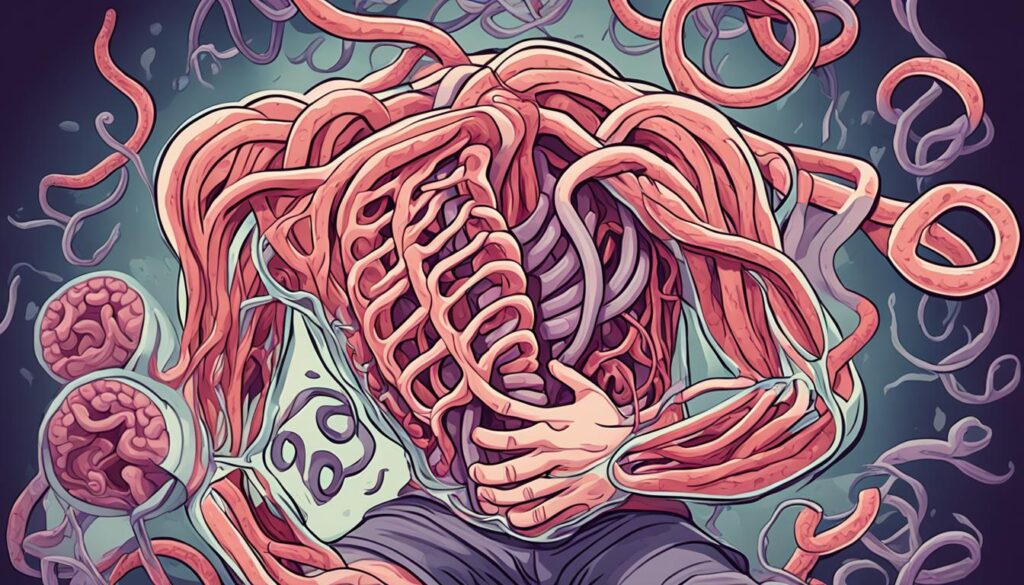
Intestinal Obstruction in Children
Intestinal obstruction is more concerning in kids than in adults. It’s often caused by a problem called intussusception.
Intussusception
Intussusception is when one part of the intestine telescopes into another part. This creates a blockage. It mainly happens to babies and young kids, usually between 3 months and 6 years old. The most common age for this to occur is between 5 and 10 months.
About 60% of those with intussusception are under 1 year old. And 80-90% are under 2. It happens more in boys than in girls. Most cases, about 90-95%, don’t have a clear cause.
It’s important to treat intussusception quickly. If not treated, it can cause serious issues like tissue death and infection. Usually, surgery is needed to fix it and return the intestine to normal.
Intestinal Pseudo-Obstruction
Intestinal pseudo-obstruction, also called paralytic ileus, shows symptoms like a blockage, but no barrier exists. This condition impacts how the intestines’ muscles or nerves work. It slows or stops the flow of food and fluids through the stomach and intestines.
Two types stand out: chronic intestinal pseudo-obstruction (CIPO) and acute colonic pseudo-obstruction. CIPO can affect kids and adults. Acute colonic pseudo-obstruction is more common in older men over 60.
Its signs are stomach pain, swelling, feeling sick, and throwing up. Doctors look at your health history, do physical exams, and tests to exclude a real obstruction.
For CIPO, treatment may involve eating and nutrition changes, medicines, releasing gases, and surgery if needed. For the acute form, doctors usually start with simpler treatments.
If you suspect you have this issue, speak with your doctor right away. Early diagnosis and treatment prevent problems and help your digestion return to normal.
Prevention of Intestinal Obstruction
Some causes of intestinal obstruction, like colon cancer, can’t be avoided. But, you can lessen your chances by managing health issues that raise your risk. Conditions like Crohn’s disease demand close control and care. Also, steps post-surgery are vital to avoid adhesions that can block your intestines.
Managing Underlying Conditions
If you face an illness that makes intestinal obstruction more likely, such as Crohn’s disease, teamwork with your doctor is key. You’ll need to use medication, diet, and more to keep your health condition in check. This helps prevent the chances of a blockage in your intestines.
Preventing Adhesions After Surgery
After abdominal or pelvic surgery, preventing adhesions is crucial to avoid intestinal obstruction. Ways to do this include ensuring incisions stay moist and following your doctor’s advice closely. With the right care, you can lower the risk of developing adhesions and a possible future blockage.
When to Seek Emergency Medical Attention
If you have severe abdominal pain, don’t wait. Seek immediate medical help. This pain could be a sign of a serious issue in the intestines. Symptoms such as this could be from an intestinal obstruction. Letting it go can make things worse, even life-threatening. So, quick action is key to getting the right treatment for intestinal obstruction.
If you can’t pass gas or stool and have intense abdominal pain, it could be serious. These signs may point to a full intestinal blockage, needing emergency help. Letting the problem grow can lead to dangerous results. So, it’s important to act fast when these symptoms show up.
Managing Intestinal Obstruction
If you get diagnosed with intestinal obstruction, your doctor might change your diet. They could suggest eating foods that are more liquid or less fiber. This makes it easier for your gut to heal.
Dietary Modifications
A liquid diet is often recommended. You’d drink things like clear broths, juices, and gelatin. This strategy gives your intestines a break. It could even help clear the blockage without surgery.
If the blockage is only partial, a low-fiber diet could be better. This means you should avoid fruits, veggies, and whole grains. Your doctor will tell you exactly what to eat. They can help in managing your intestinal obstruction well.
Follow-Up Care
Your doctor will also talk to you about what to do next. This could mean checking regularly to see if the issue comes back. They might also treat any other health problems that are linked, like Crohn’s disease or colon cancer.
Listening to your doctor is really important for getting better. Make sure to follow their advice closely. Staying in touch and going to your check-ups will help you heal fully. It’s crucial for keeping your digestion in good shape.
Conclusion
Intestinal obstruction is a health issue that needs quick action to avoid severe problems. Knowing its signs and getting fast medical help is important. This way, many people can heal and enjoy their usual eating habits again.
Some reasons for intestinal blockages can’t be avoided. However, managing health issues like bowel diseases is crucial. If you’ve had stomach surgery before, preventing adhesions is key to lower your risk of another obstruction.
If you feel sharp stomach pain or can’t pass waste, get help right away. Waiting too long to address these symptoms might make things worse. But, early treatment can help most people clear the blockage and eat normally again.
FAQ
What is intestinal obstruction?
Intestinal obstruction is when a blockage stops food or liquid from moving through your intestines. It affects how your body digests food normally.
What are the common symptoms of intestinal obstruction?
You may feel crampy pain in your stomach or not want to eat. Constipation, throwing up, and not being able to pass gas or stool are also signs. Your stomach might feel swollen.
What are the main causes of intestinal obstruction in adults?
In adults, the top causes are things like intestinal adhesions and hernias. Colon cancer and Crohn’s disease, which affect the intestines, are also big reasons.
What risk factors can increase the likelihood of developing intestinal obstruction?
Surgical procedures in the belly, Crohn’s disease, and abdominal cancer can increase your risk. They might cause scarring or other changes that block your intestines.
How is intestinal obstruction diagnosed?
Diagnosis includes your medical history and a physical exam. Doctors may also use tests like X-rays or CT scans to get a closer look inside you.
What are the treatment options for intestinal obstruction?
Treatments depend on what causes the blockage and how bad it is. You might get IV fluids, a tube through your nose into your stomach, or certain medicines. But, surgery is sometimes needed.
What are the potential complications of untreated intestinal obstruction?
Not treating this condition can be very dangerous. It might lead to problems like tissue death, a hole in your intestine, or a severe infection.
How is intestinal obstruction in children different from adults?
For kids, a condition called intussusception is a more common issue. It’s a serious problem where one part of the intestines folds into another.
What is intestinal pseudo-obstruction and how does it differ from a physical blockage?
Intestinal pseudo-obstruction causes symptoms similar to a blockage but without any physical stoppages. This condition affects the muscles or nerves, stopping the intestines from moving food normally.
How can you prevent intestinal obstruction?
You can lower your risk by managing issues like Crohn’s disease well. And, after belly surgery, try to avoid adhesions by keeping the surgical area moist.
When should you seek emergency medical attention for intestinal obstruction?
If you have very bad stomach pain or any of the other symptoms, get help right away. Not addressing these signs could lead to life-threatening problems.
About The Author

Medically reviewed by Dr. Nivedita Pandey, MD, DM (Gastroenterology)
Senior Gastroenterologist & Hepatologist
Dr. Nivedita Pandey is a U.S.-trained gastroenterologist and hepatologist with extensive experience in diagnosing and treating liver diseases and gastrointestinal disorders. She specializes in liver enzyme abnormalities, fatty liver disease, hepatitis, cirrhosis, and digestive health.
All content is reviewed for medical accuracy and aligned with current clinical guidelines.
About Author | Instagram | Linkedin


